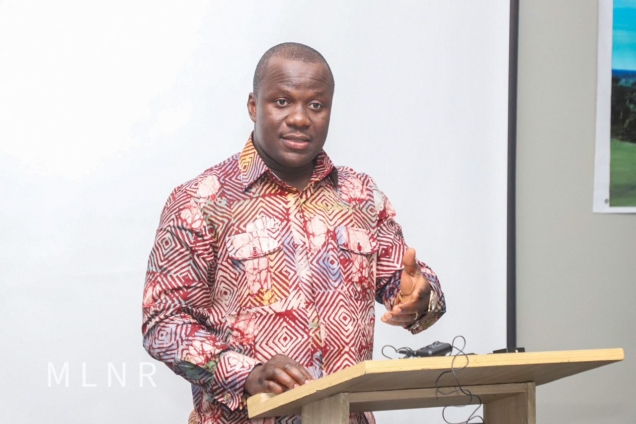Minister for Lands and Natural Resources, Samuel Jinapor, has said that the West African Sub-region annually loses US$26 billion to illicit trade in marine, including illegal fishing.
“On the economic front, Interpol estimates that 38 percent of global criminal proceeds are derived from nature crimes,” he said.
Mr Jinapor was addressing selected media personnel at the nature crimes in Ghana workshop, organised by the US Agency For Global Media- USAGM, held in Accra.
He said crimes against nature were diverse, and cut across various sectors of the economy, including land, forestry, mining, environment, fisheries, maritime, and waste management.
“Crimes such as illegal fishing, illegal mining, illegal logging, illegal overland export, under-declaration of products, mislabeling of products, poaching, wildlife trafficking, illicit wildlife trading, and land degradation, continue to threaten our environment, biodiversity, and the lives and livelihoods of millions of people across the world, while robbing us of the resources needed for development,” the Minister said.
He said these crimes had damaged some vital and vulnerable ecosystems in the world, such as forests, wildlife, oceans, wetlands, coral reefs, and mangroves.
The Intergovernmental Science-Policy Platform on Biodiversity and Ecosystem Services (IPBES) reports that globally, nature is declining at rates unprecedented in human history, and species’ extinction is accelerating at an alarming rate, he quoted.
IPBES, he said estimated that around one million animal and plant species were now threatened with extinction within the next decades, adding that these crimes, also, affected global efforts at halting climate change.
The Minister cited a report jointly produced by the World Wildlife Fund (WFF) and the United Nations Office on Drugs and Crime (UNDOC), that nature crimes accounted for about 26 percent of global emissions and remained a major stumbling block to attaining the 1.5 degrees Celsius target.
He said government had adopted a comprehensive and coordinated approach to deal with crimes associated with logging, mining, wildlife and land conversion.
They include law enforcement measures, policy, legislative, regulatory and operational reforms, stakeholder engagements as well as the use of technology to prevent, detect, investigate, prosecute, and punish these crimes.
While working to prevent these crimes, we continue to implement our aggressive afforestation and reforestation programme, including the flagship Green Ghana Project, to restore what has already been lost and mitigate the impacts of climate change, he said.
On the other hand, he said those whom nature crimes were perceived as a means of survival, government had introduced a Community Mining Scheme, for instance, to help them engage in lawful, sustainable, responsible and environmentally-sound mining practices as well as introduced a National Alternative Employment and Livelihood Programme (NAELP) to provide other sources of livelihood for these people.
He said measures would not yield the needed results without the collaboration of other stakeholders, especially the media with their power to engage and inform.
Mr Kyei Kwadwo Yamoah, a resource person in the Fisheries Sector, said Illegal Unreported and Unregulated (IUU) fishing had been identified globally as a major threat to the sustainability of the fisheries resource.
“Globally it is estimated that IUU fishing is worth over 10 billion dollars and African countries of the Gulf of Guinea with little or no capacity to monitor their fisheries are the main victims of the practice,” he said.
Mr Yamoah said most of IUU fishing practices had gained strong roots among the fishers because of a long absence of effective and sustainable enforcement actions as there is weak enforcement of the fisheries laws and regulations due to inadequate resources (both human and financial) and inadequate conflict resolution mechanisms.
Mr Kevin J. Brosnahan, Press Attaché, US Embassy in Ghana, Public Affairs Section, encouraged media practitioners to help the public understand nature crime, not just being whistle blowers but reporters of good and positive news.
He said the US Government was committed to the fight against nature crime and advised that Ghana should protect its natural resources in order not to cause severe damage to the ecosystem.
Joan Mower, Director of Development and Training-USAGM, Mr Todd Brown, Trainer of Photography and TVnews production, Voice of America, Madam Ann Mikia, Senior Media Trainer, took journalists through practical steps of creating a digital story, solution journalism, among others. Participants aside from that had field trip to the Ghana Ports and Harbour, Tema Fishing Harbour as part of the workshop.
Latest Stories
-
Syria’s minorities seek security as country charts new future
33 minutes -
Prof. Nana Aba Appiah Amfo re-appointed as Vice-Chancellor of the University of Ghana
39 minutes -
German police probe market attack security and warnings
40 minutes -
Grief and anger in Magdeburg after Christmas market attack
41 minutes -
Baltasar Coin becomes first Ghanaian meme coin to hit DEX Screener at $100K market cap
2 hours -
EC blames re-collation of disputed results on widespread lawlessness by party supporters
2 hours -
Top 20 Ghanaian songs released in 2024
2 hours -
Beating Messi’s Inter Miami to MLS Cup feels amazing – Joseph Paintsil
2 hours -
NDC administration will reverse all ‘last-minute’ gov’t employee promotions – Asiedu Nketiah
3 hours -
Kudus sights ‘authority and kingship’ for elephant stool celebration
3 hours -
We’ll embrace cutting-edge technologies to address emerging healthcare needs – Prof. Antwi-Kusi
3 hours -
Nana Aba Anamoah, Cwesi Oteng special guests for Philip Nai and Friends’ charity event
3 hours -
Environmental protection officers receive training on how to tackle climate change
3 hours -
CLOGSAG vows to resist partisan appointments in Civil, Local Government Service
4 hours -
Peasant Farmers Association welcomes Mahama’s move to rename Agric Ministry
4 hours

